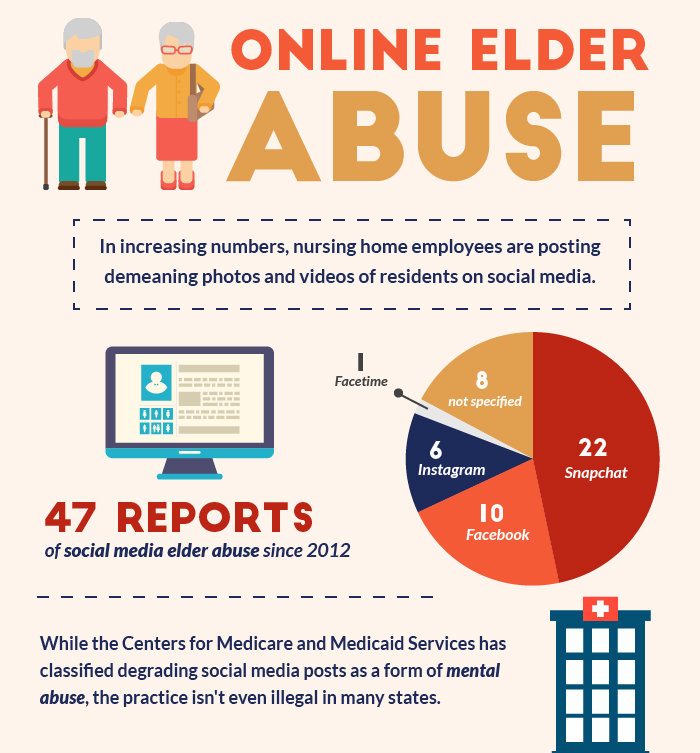Nursing home abuse has now entered the digital age. In increasing numbers, nursing home employees are sharing degrading and abusive photographs of residents on social media, according to reporting from independent journalism network ProPublica. State and federal regulators have scrambled to address the emerging issue, but many health officials have been shocked to learn that mental abuse committed online isn't yet illegal in some states.
Keep reading related information on What You & Your Loved Ones Need To Know About Elder Abuse.
At least 47 instances of social media abuse have been reported since 2012, ProPublica reports, although the true incidence is likely higher. Convincing nursing home employees to report other workers for social media misconduct is difficult.
The details of these photos and videos, many posted to public social media accounts, are horrifying. Reviewing government citation reports and court records, ProPublica discovered numerous cases in which assisted living facilities had circulated images of elderly residents "naked, covered in feces or even deceased."

Some videos have depicted episodes of physical and verbal abuse. In one video shared on Facebook, a former nurse aide from St. Ann's Home for the Aged in Rochester, New York filmed facility employees tugging a resident's hair and verbally abusing her with racially-charged taunts. Snapchat conversations in Green Bay, Wisconsin have seen nursing home employees exchange photos of nude and vomiting residents, even sharing the images with friends.
Currently, Snapchat seems to be the most popular social media network for degrading posts involving elders:
Snapchat is not a surprising choice for this kind of dehumanizing activity. The application was designed to delete images shortly after they are shared.
More shocking? In some cases, this form of abuse isn't even illegal. In March 2016, Iowa state health investigators learned that a certified nursing assistant had taken a humiliating picture of one of her patients, depicting the man with his "pants around his ankles, his legs and hands covered in feces." But Iowa's elder abuse law hasn't been updated since 2008, before the rise of Snapchat and Instagram and around a year before Facebook became profitable.
The photos and videos have been tricky for prosecutors to classify since many of the images don't technically qualify as "sexual." Only pictures or recordings depicting genitalia can be designated as "sexual exploitation" in Iowa, leaving the state with few options for formal disciplinary action. Today, the legislature in Iowa is attempting to revise the state's elder abuse laws to cover the new area of abuse.
Prosecutors in other jurisdictions have come up with creative ways to tackle the issue, using voyeurism and invasion of privacy charges to make up for the lack of specific laws addressing elders and demeaning social media posts.
New York is no exception. In the Rochester case, a nurse aide pleaded guilty to one misdemeanor, a count of willful violation of health laws. In a second New York case, a nurse's aide at Lancaster's Greenfield Health and Rehabilitation Center took photographs of an incontinent resident's 
Felony charges have been sought in egregious cases, at the discretion of state prosecutors. A nursing assistant in Scottsburg, Indiana was charged with voyeurism after photographing a resident who was verbally abusing other residents at the time. In Michigan, a nursing assistant allegedly took a photograph of an elderly resident using the toilet, then drew a penis over the picture in Snapchat. The assistant, who was charged with a felony for using a computer to commit a crime, denies any wrongdoing.
As legislatures struggle to draw up new online abuse laws, state officials have attempted to enlist social networks themselves in fighting online posting involving seniors.
For obvious reasons, elders are working at a distinct disadvantage in proactively eliminating online privacy abuses. Few seniors have even heard of Snapchat - let alone understand how to navigate the application's abuse reporting system. Family members and loved ones have also been stymied, by company policies that prevent third-parties from reporting abusive images or videos. Snapchat, for example, only allows the affected person to file complaints, particularly difficult for seniors with dementia.
In response to calls from members of Congress, both Snapchat and Facebook, which owns Instagram, say they are "doing what they can" to prevent abusive content from being published and shared on social media networks, according to recent reporting from ProPublica.
Degrading social media posts have been labeled a form of "mental abuse" by the Centers for Medicare & Medicaid Services, a category of intolerable acts that "includes, but is not limited to, humiliation, harassment, threats of punishment or deprivation." In August 2016, the federal agency instructed nursing homes to establish and implement written policies prohibiting all forms of mental abuse, including "taking or using photographs or recordings in any manner that would demean or humiliate a resident." These policies will be reviewed by government investigators during upcoming inspections.
Federal regulations require that nursing homes create "homelike" environments, in which all residents are treated with dignity and respect. Practices that demean, degrade or humiliate residents are strictly forbidden. Nursing home residents have "the right to be free from verbal, sexual, physical and mental abuse, corporal punishment and involuntary seclusion."
In response to the recent rise in social media abuse among nursing home employees, the US Centers for Medicare & Medicaid Services has announced concrete procedures for investigating allegations and disciplining non-compliant facilities.
When investigators receive a tip that nursing home employees have taken a potentially demeaning photograph, the inspectors will be required to investigate the incident as abuse, a potential violation of federal regulations. Notably, a resident's consent will not be sufficient to avoid government sanction over a degrading photo.
Photos and videos that will constitute abuse automatically include:
Allegations of unauthorized photography or recording will trigger an onsite investigation, generally within two to ten days. Depending on the allegation's severity, law enforcement may be called in to assist in investigation and enforcement efforts.
See similar articles such as: Poor Dental Hygiene In Nursing Homes